Tropical field science is not for the faint of heart.
And neither is Papua New Guinea.
In July I joined Nature Conservancy scientists Eddie Game and Tim Boucher for 10 hard days of fieldwork in Papua New Guinea’s Adelbert Mountain range. Together with Princeton University tropical forest ecologist Zuzana Burivalova, we trekked up, down, and through some seriously rugged rainforest terrain to deploy acoustic sampling recorders. The soundscape data we recorded will help the Conservancy guide conservation land use planning with local communities.
For the one non-scientist in the group (me) the expedition was a deep-dive into the challenges, thrills, and adventures of fieldwork in the tropics. Or anywhere, really.
So what did I learn? There’s a lot more behind the data than you think there is. Nothing ever works the way it’s supposed to in the field. And things get weird in the jungle.
Here’s what a typical day is like for a field scientist in the Papua New Guinea rainforest.
5:53 a.m. The village wakes up. Burrowed in our sleeping bags (yes, it gets cool in the tropics) we do our best to ignore the incessant roosters, banging pots, and Tok Ples chatter seeping through the woven grass walls of our hut.
7:04 a.m. Daylight forces us awake, there’s no fighting it. As we struggle out from beneath our bedding and mosquito nets, I realize that the 13-kilometer hike we did yesterday has left my legs so tight and sore that I nearly fall over while trying to get up.
We all need coffee. Immediately. This one morning ritual is holding our sanity together. Eddie lights the tiny propane stove and fills the espresso pot, while everyone else stumbles around on the hut’s rickety palm-bark planks, trying to put in contact lenses and find our bowls.
We drink quickly and munch granola bars. Tim hears a bird and wanders off across the village to find it, binoculars in hand and barefoot. He returns for the toilet paper, appropriately wary of the toilet’s rather curious resident tarantula.
8:22 a.m. It’s time to do some science. All of our field equipment has to be checked daily — batteries replaced, fresh SD cards programmed and installed, screws tightened — and stowed into our daypacks along with the other essentials: map, GPS, rope, tape, straps, screwdriver, Hi-Way beef-flavored crackers, water, bananas, and notebooks.
Those of us that have been avoiding sliding back into our still-damp clothes — myself included — finally have to suck it up and get dressed. Tim and I slap some band-aids onto our blisters and gingerly lace up our sodden, fetid shoes. Our guides are already waiting.
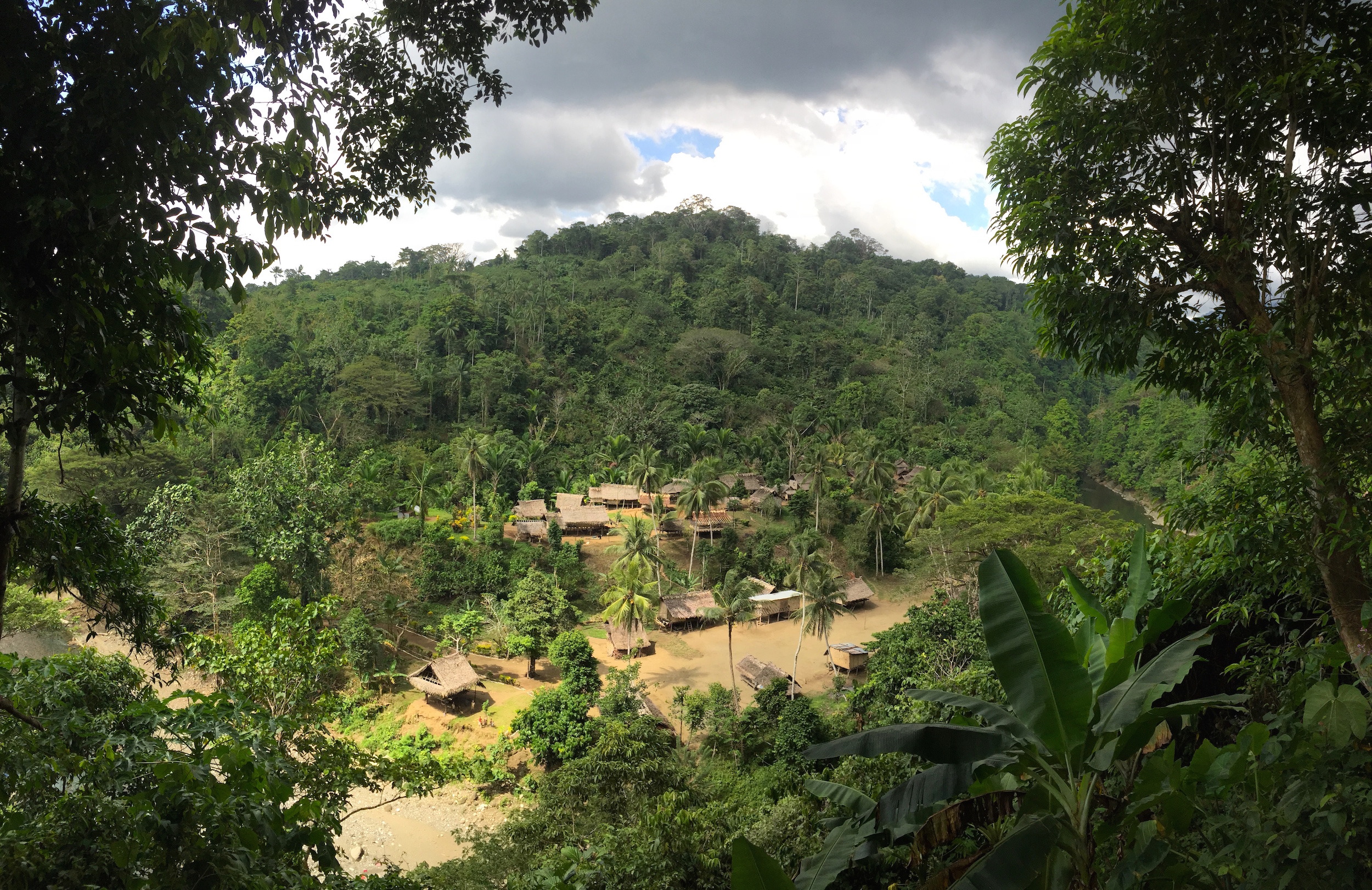
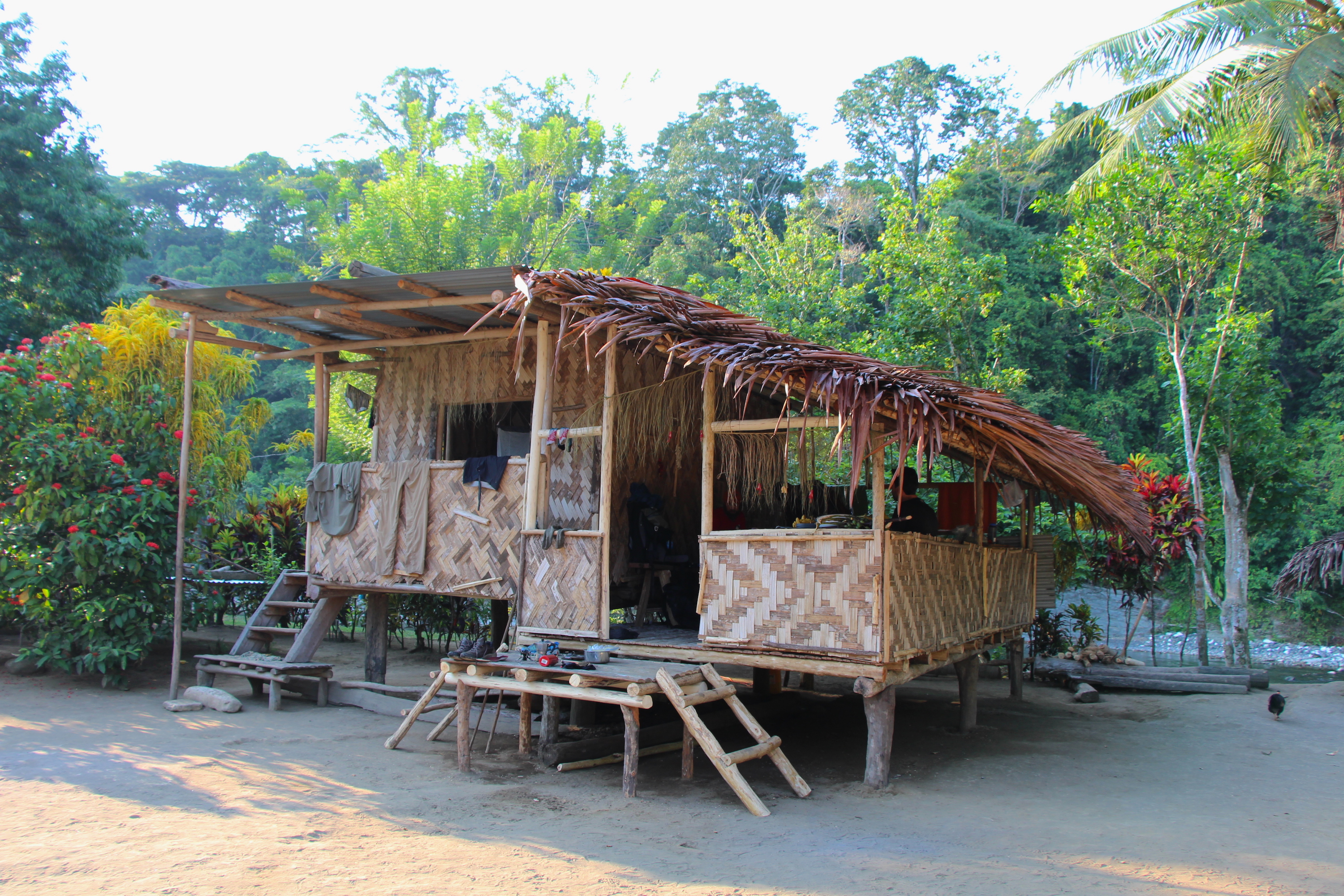
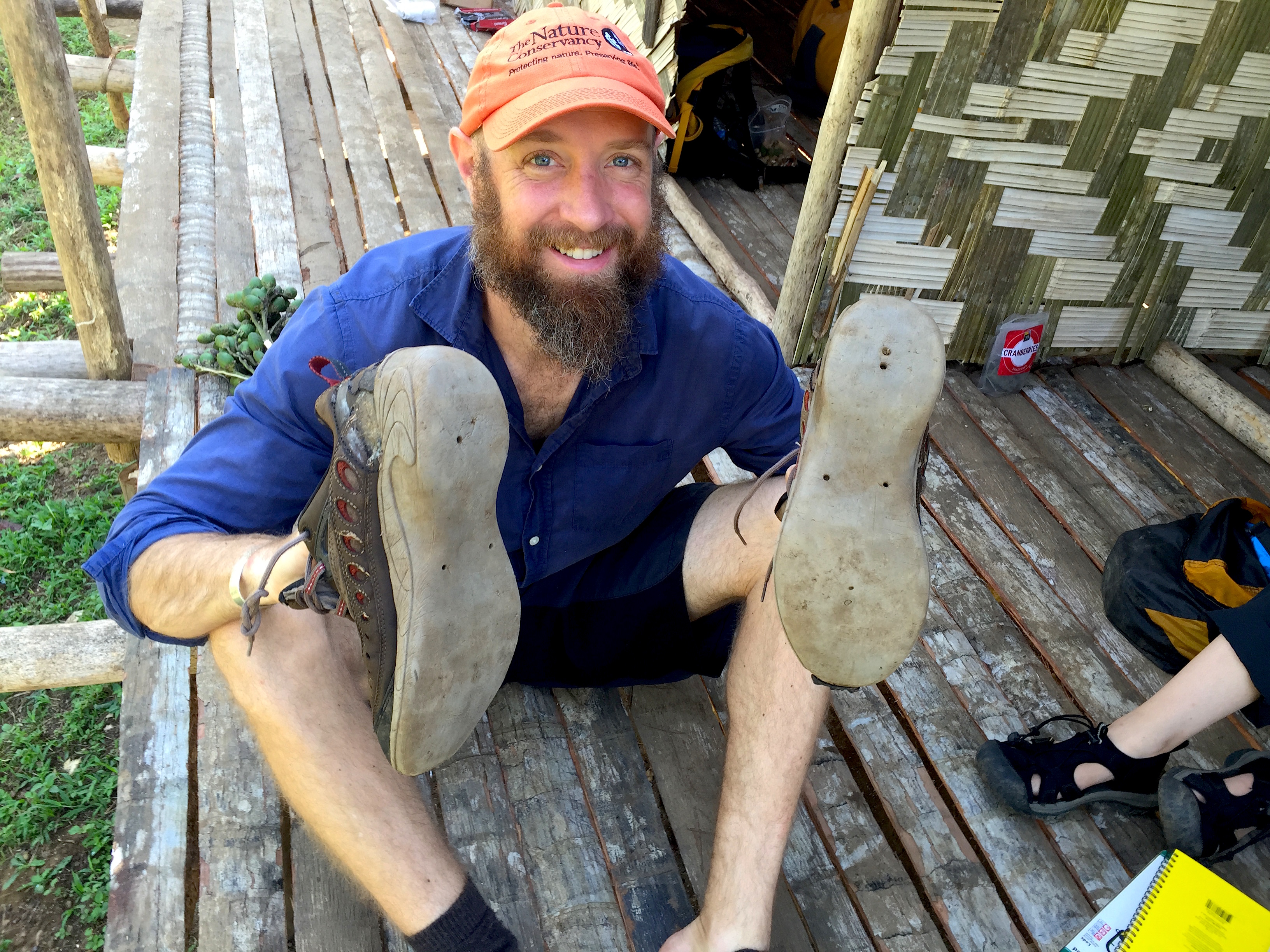
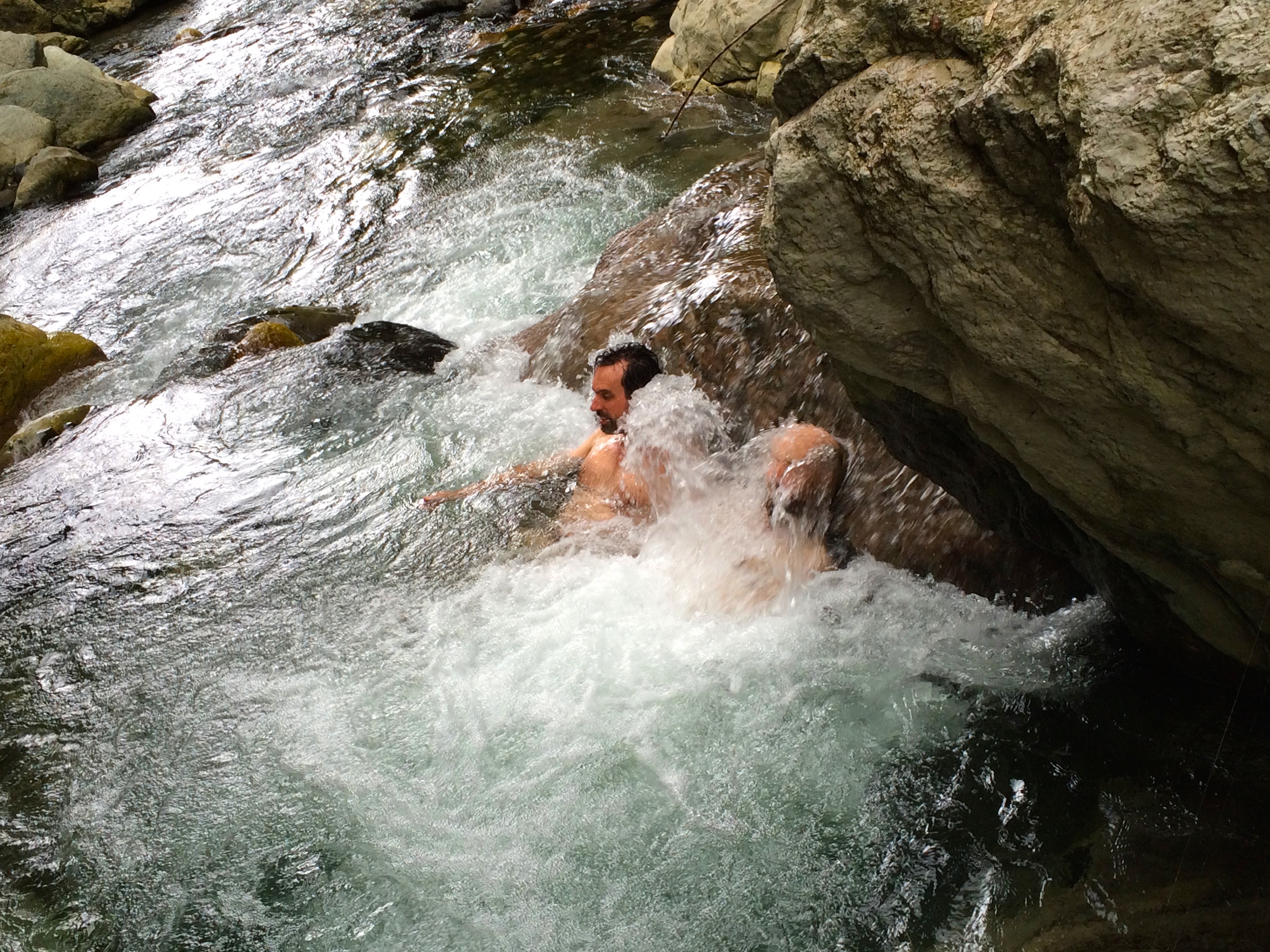
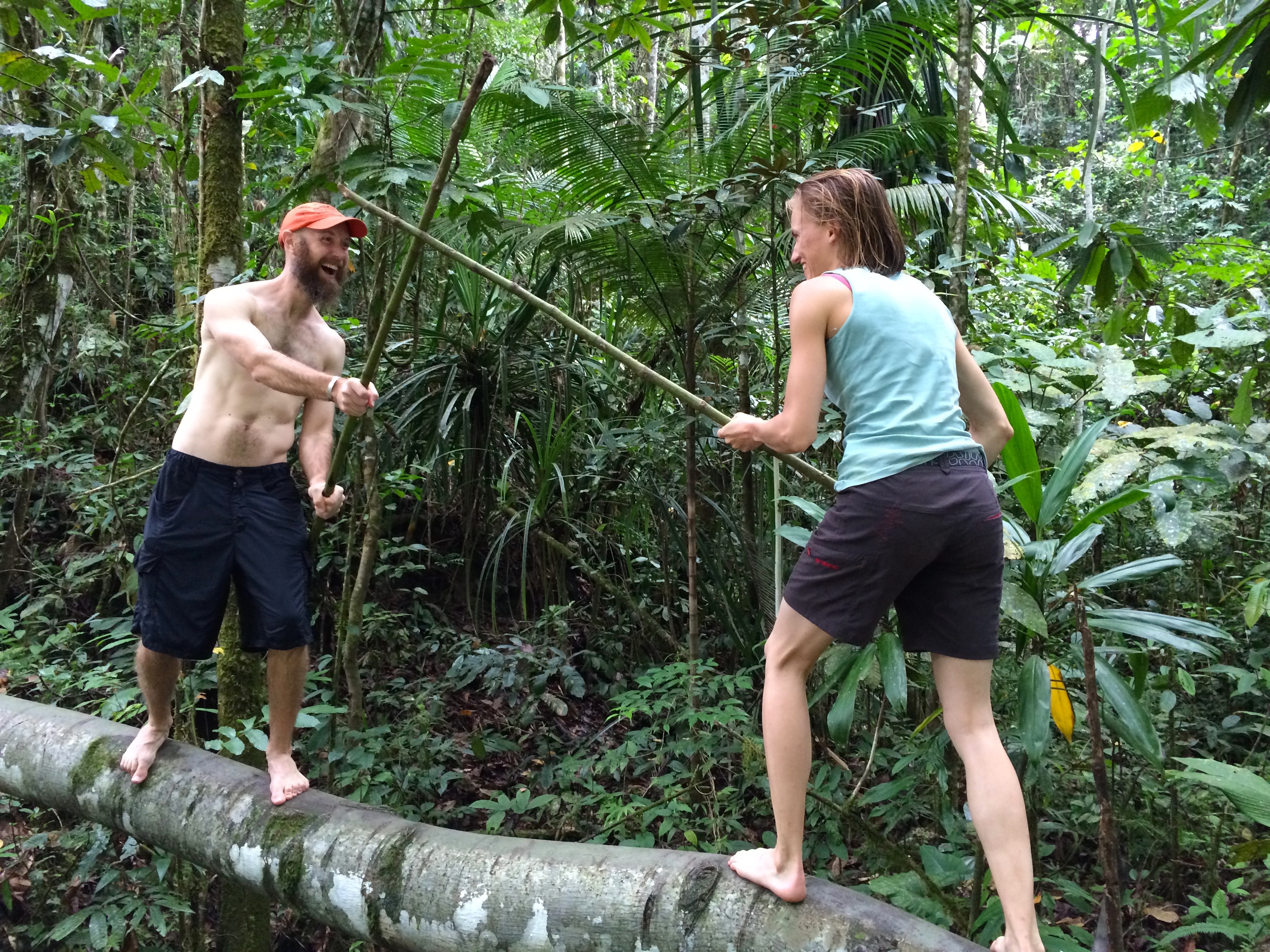
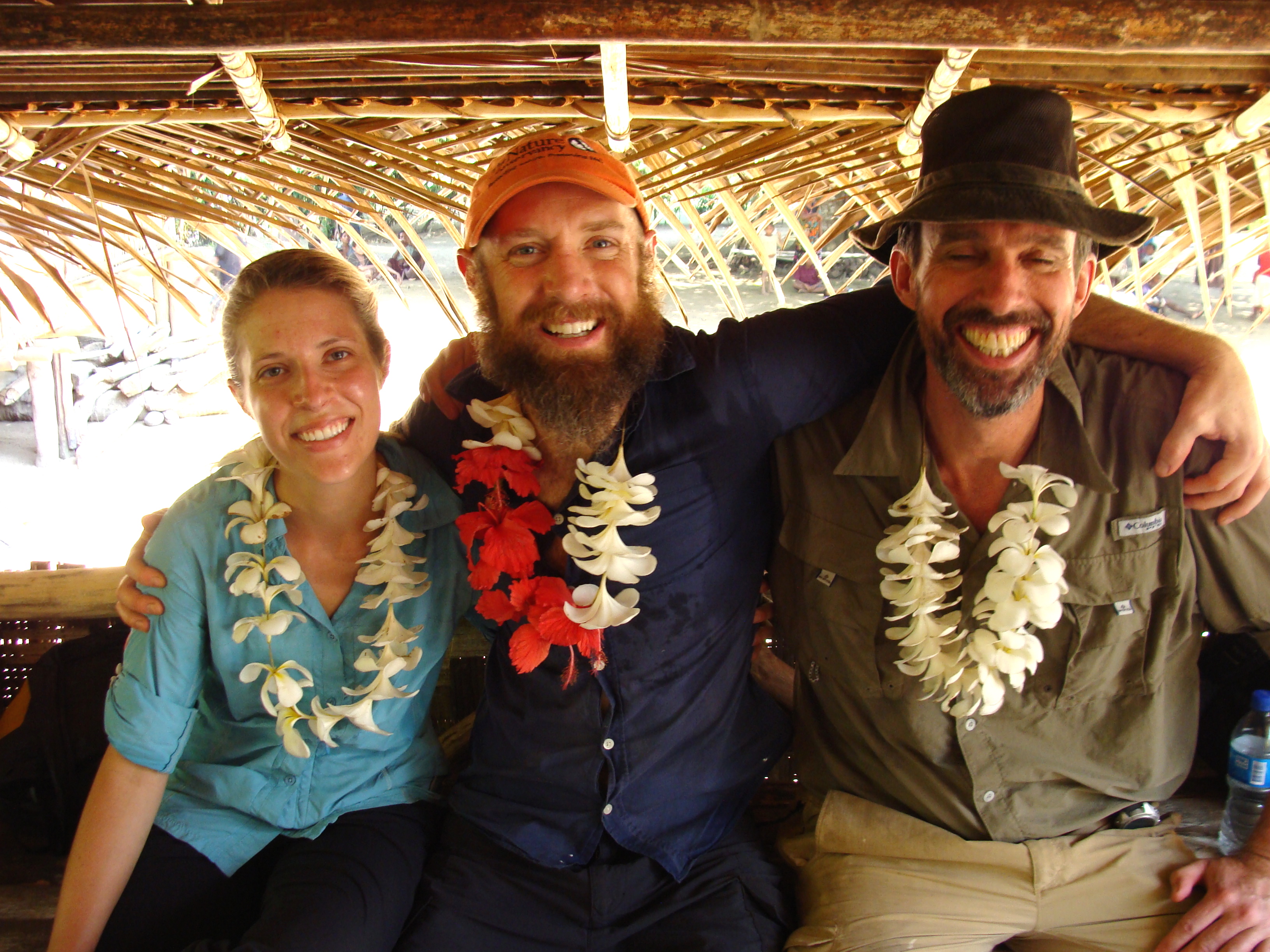
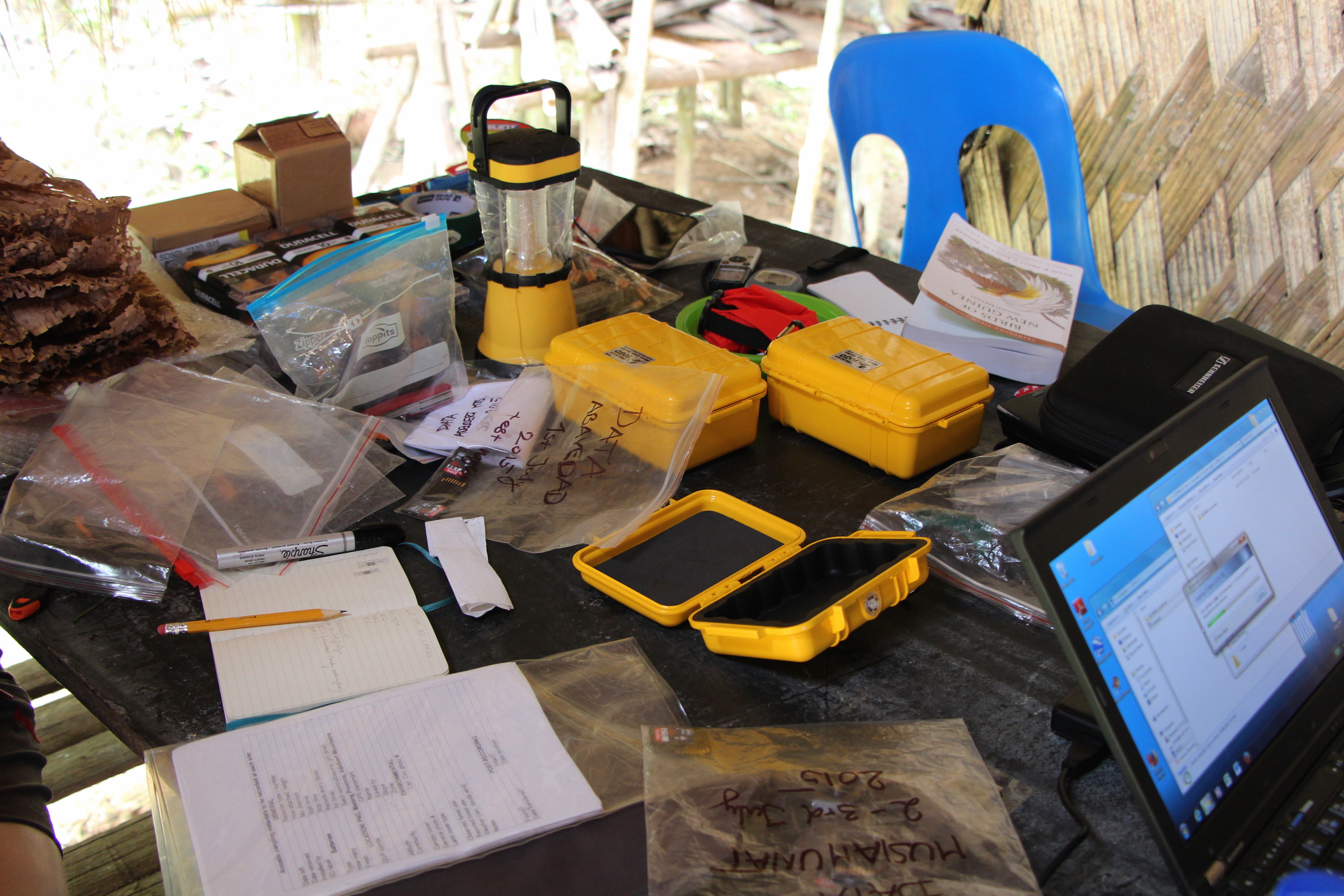
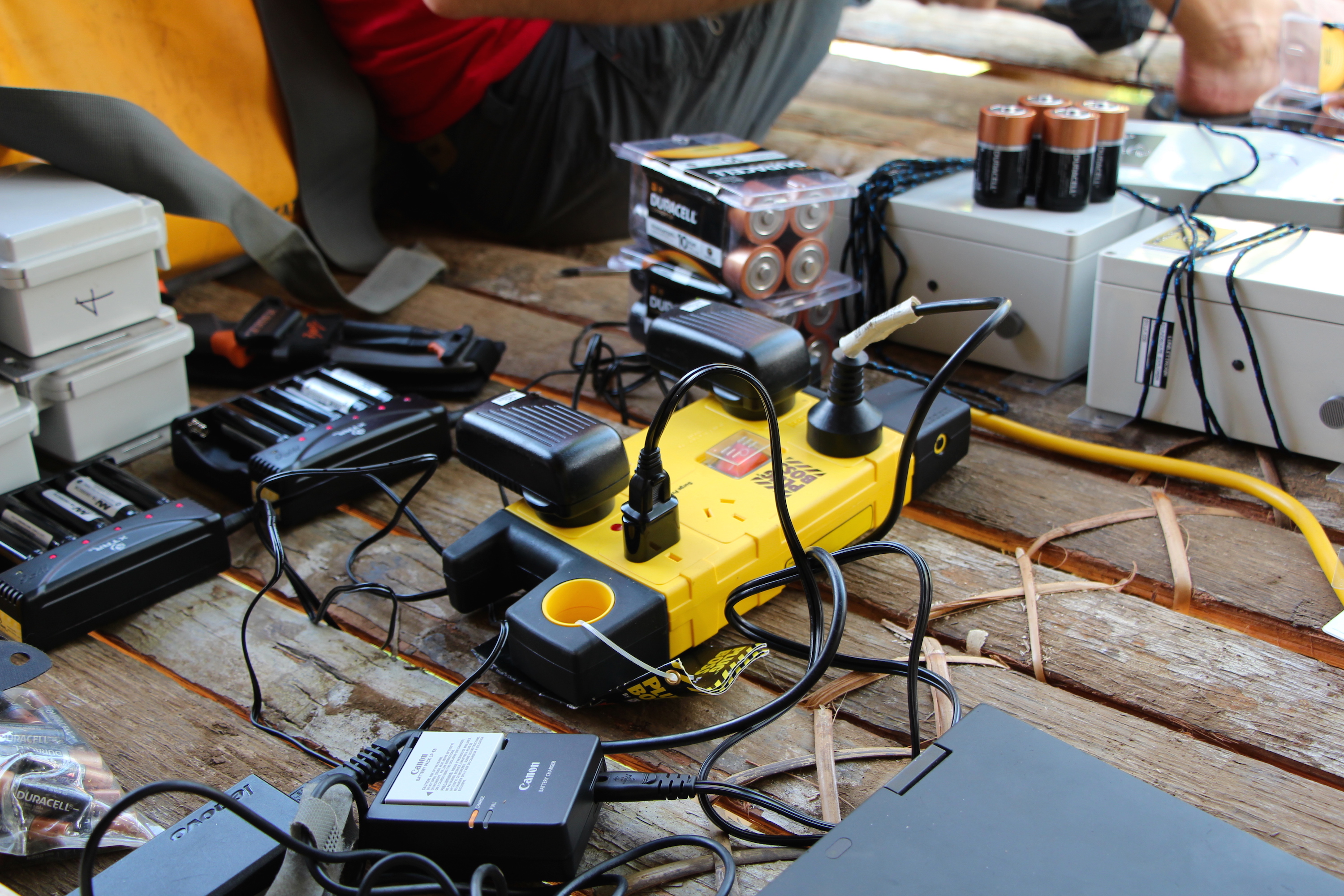
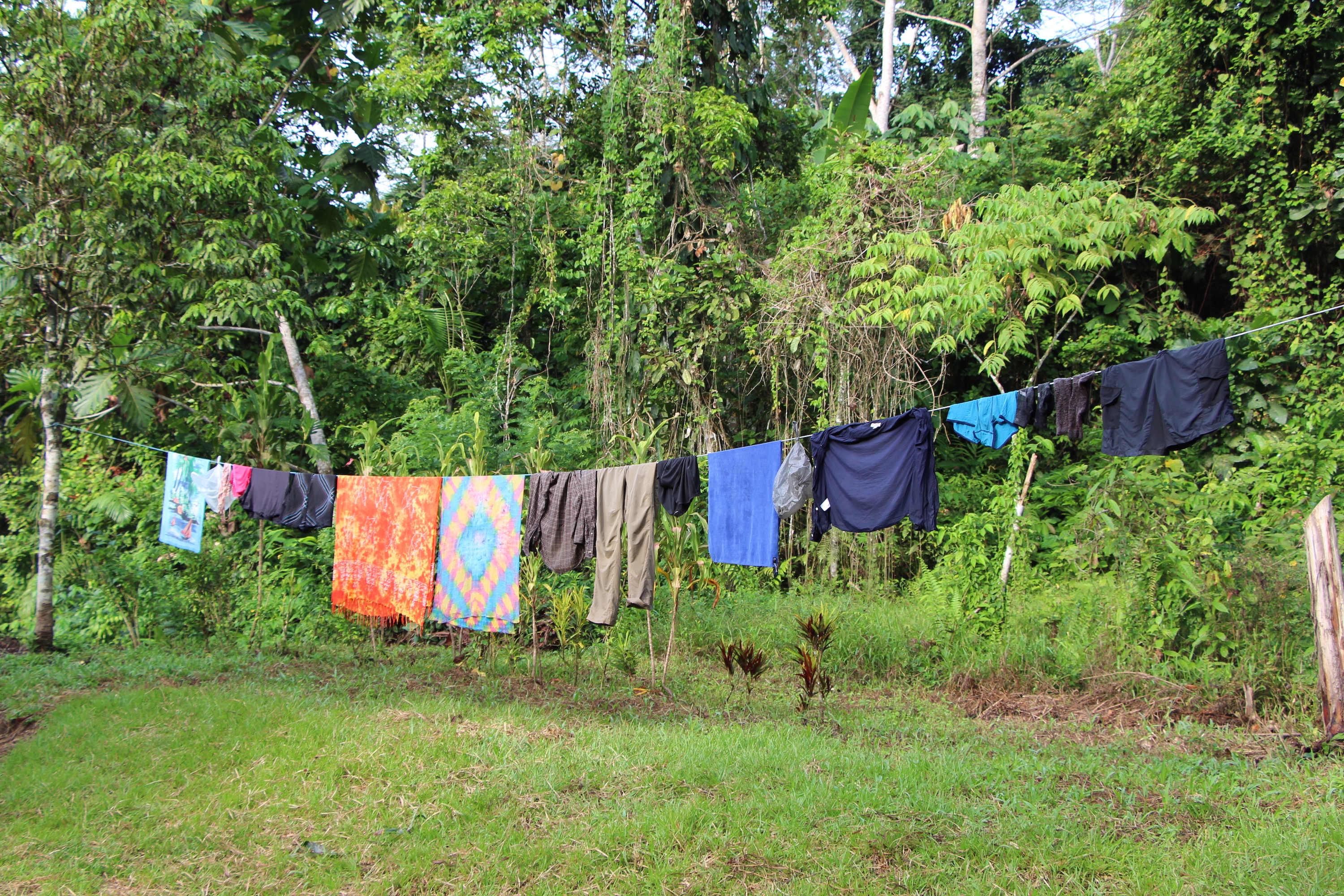
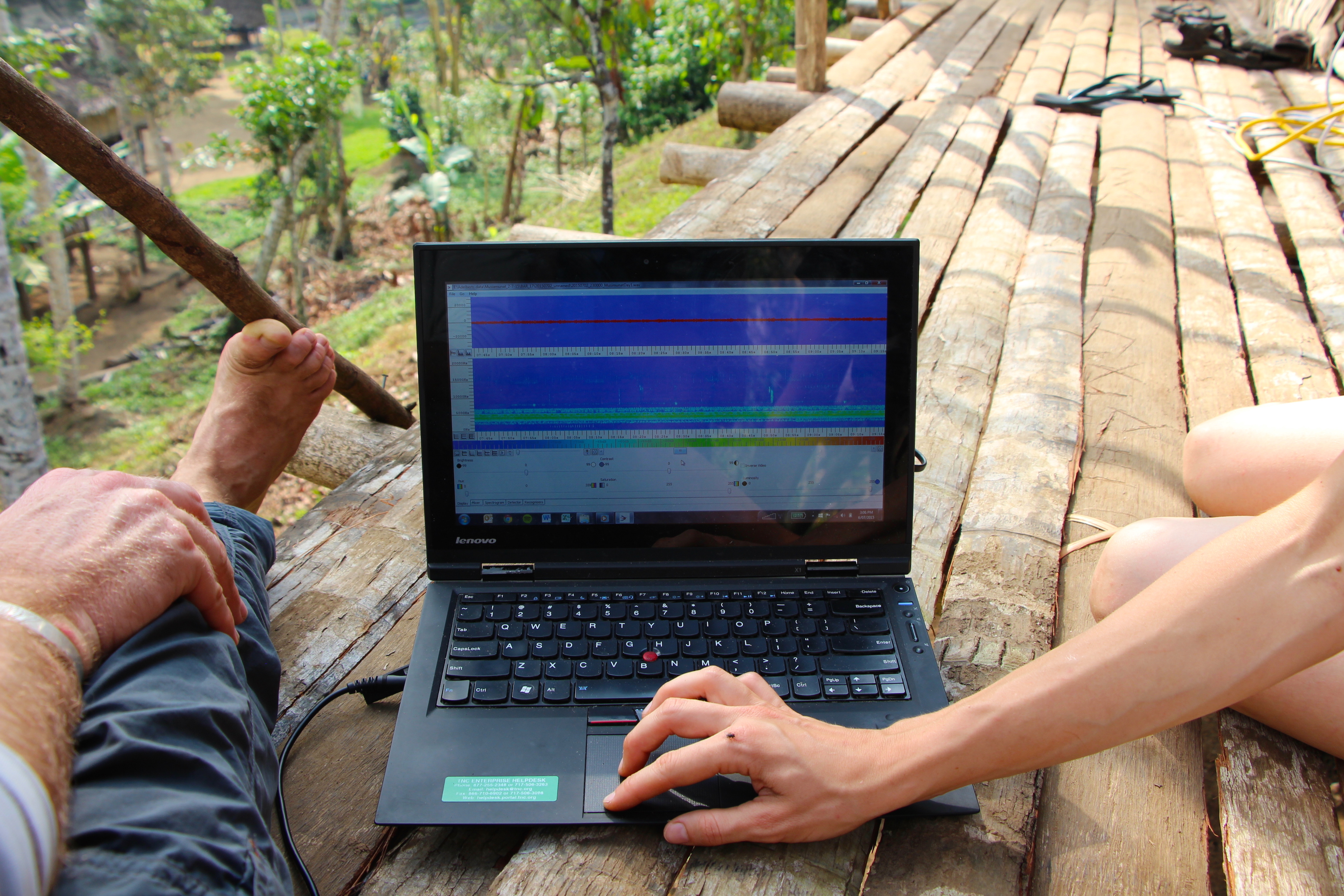
11:13 a.m. We’re an hour into our hike and it’s not going well.
Still recovering from colds (thank you, germ-ridden international flight) Tim and I have a wicked post-nasal drip and are not quite acclimatized to the rigors of fieldwork. Meanwhile, Zuzana is zipping up the trails, full of energy despite carrying the heaviest pack, while Eddie jogs along behind her like a mountain goat on steroids.
Tim and I collapse onto a log, ignoring the ants. Our guides inform us that we’re still a full 7 kilometers away from the conservation area where we want to deploy the first set of recorders. Eddie makes the wise suggestion that Tim and I work our way back to the village, birding as we go.
We don’t argue.
1:40 p.m. We’re still hiking. We’ve seen a few Blyth’s Hornbills and a Sulpher-crested Cockatoo, but our bird list is pathetically short. I’m not surprised. The trail is steep and slippery, and I need every ounce of concentration in me to avoid tumbling down the mountainside.
Despite my focus, I slip on a patch of rotten rock and fall on my butt. Hard. Mere seconds after I right myself, Tim comes careening down the trail behind me, crashing into my legs and sending me sprawling back into the leaf litter.
Our guides stare at the trail in genuine confusion, wondering what we slipped on, as Lesser Birds-of-Paradise call from the canopy, taunting us. There’s nothing to do but laugh.
3:35 p.m. Tim and I arrive back at camp, trudging wearily but still happier here than in the office. Eddie and Zuzana return moments later, still inexplicably chipper despite having walked through a patch of salat — the local equivalent of stinging nettles.
Sprawling on the wooden floor of the hut, Eddie and Tim grab bush knives and attempt to hack open up some coconuts. Three locals immediately run over to assist, and we drink coconut water and eat bananas until we’re about to burst.
Tim and I peel off our socks and check for any new blisters, while Eddie inspects his boots: the soles are slowly rotting off. Zuzana remains entirely unaffected by the conditions, a super-human ability only partly explained by her extensive fieldwork in Madagascar and superb rock-climbing fitness.
Damage assessed, we all head down to the river for a swim and a wash, hoping that the sun will hold long enough to half-dry our sweaty clothes. Sitting in the river is the cleanest and the coldest we will feel all day.
5:10 p.m. It’s dinner time, kindly cooked by the local women. Bowls of food arrive, protected from the flies by a banana leaf, and we play the guessing game: Will it be yams with jungle plants and boiled meat? Or the house special: white rice, Magi noodles, canned corned beef, mackerel, and jungle plants?
Hint: There is no third option.
When the food arrives, Tim begins frantic search through his pile of detritus — which bears an eerie resemblance to a megapode nest — for the hot sauce. We shovel everything down as fast as possible and move on to desert: papaya and sugarcane. Both are excellent, although we’re all inexplicably craving mangos.
6:58 p.m. It’s business time. The recorders we deployed two days ago are back — retrieved by local conservation rangers who can move through the forest infinitely faster than we can — and it’s time to download the audio data. If it’s not stored in three places it doesn’t exist.
Eddie and Zuzana disassemble all of the recorders and back up the SD cards one by one. As the data come in, we take a moment to rock out to the sounds of the rainforest; there’s something pretty special about being able to jam to your data.
Mid-way through the process, Zuzana discovers that a tree rat has gnawed the foam off of one of the microphones. She proceeds to give us all an education in cursing in Italian. As dusk falls, the rest of the village gathers to watch us work.
Tim heads to the stream to fetch water, and is hailed with joyous cries of “Muruk” — the local word for cassowary — by the villagers. His towering height and gangly walk prompted the nickname, which was so apt and beloved that it actually preceded us from village to village.
When he returns, we start sterilizing several liters of water with our steri-pens via a complicated system of wide-mouth and disposable plastic water bottles. Treated water to Tim’s left, untreated water to my right. The consequences of confusion could be serious, but thankfully we’ve all avoided any major digestive troubles. Fingers crossed.
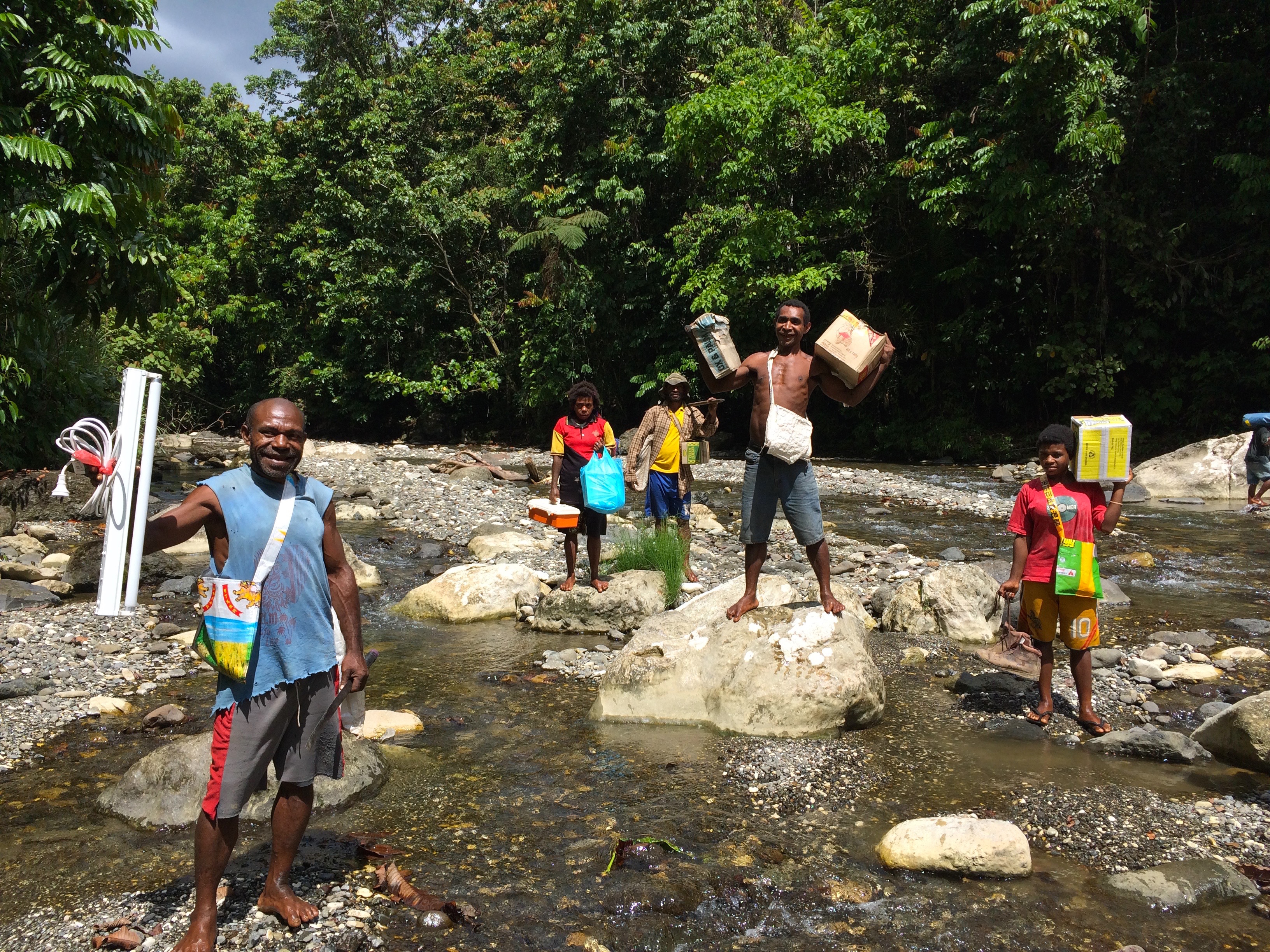
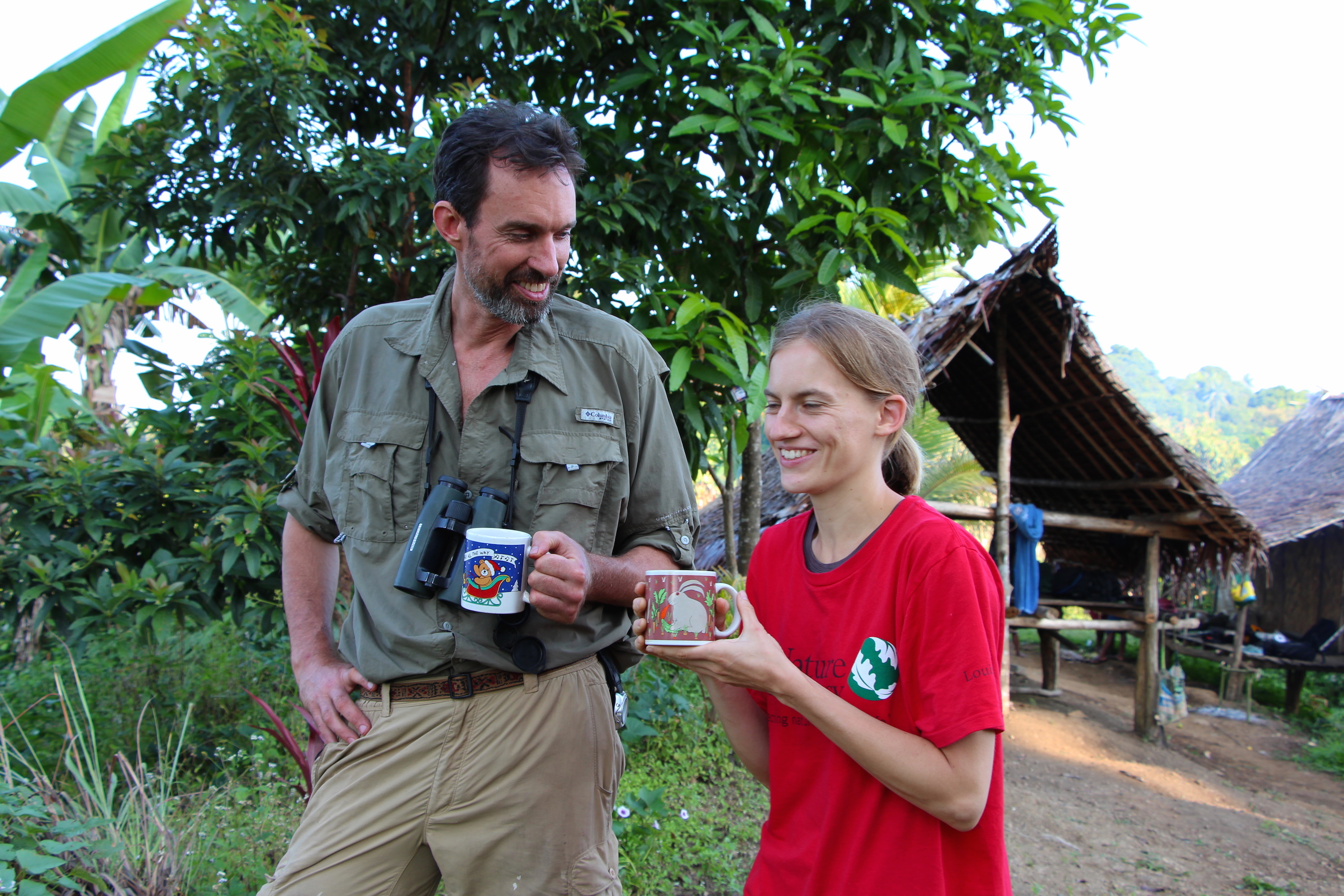
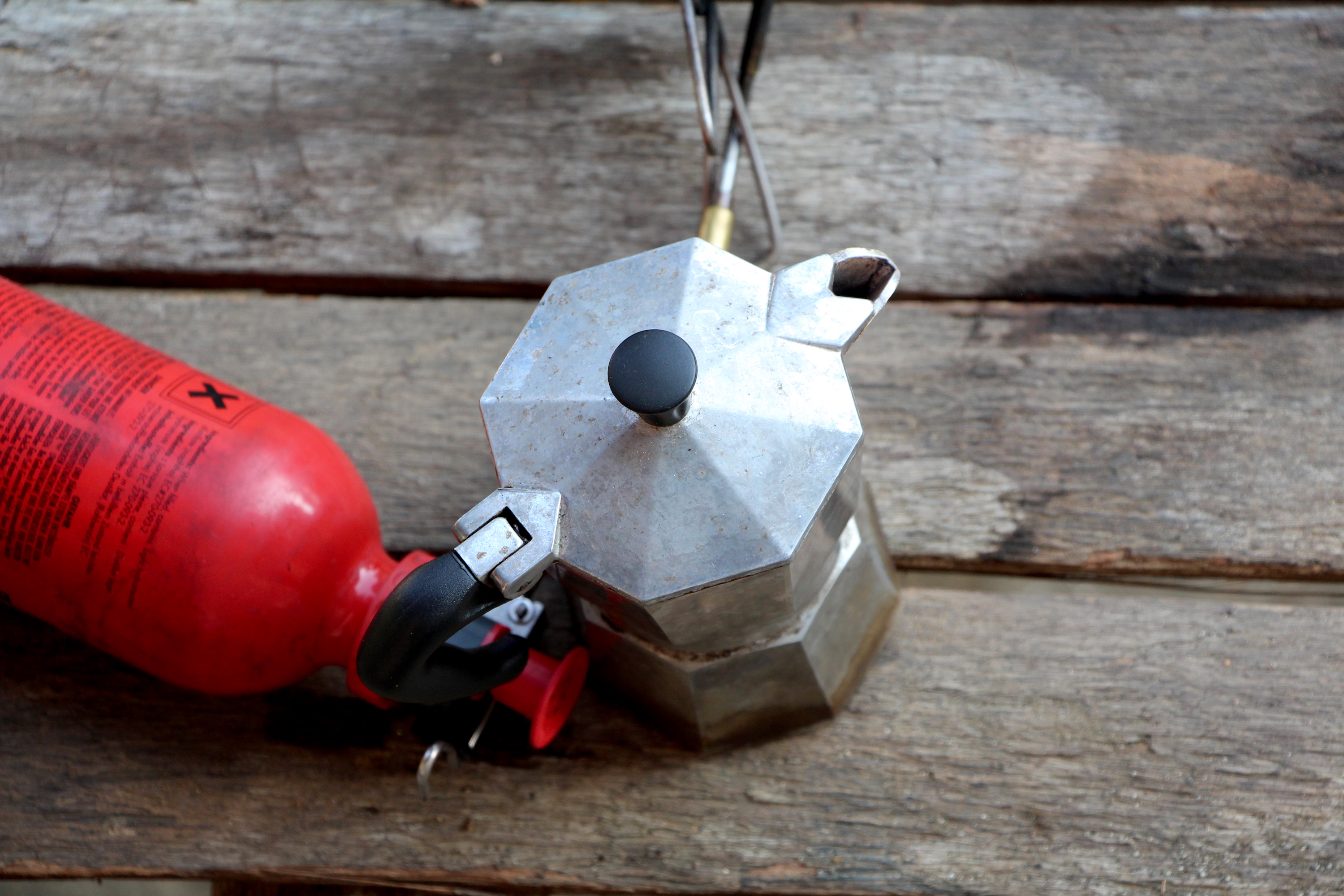
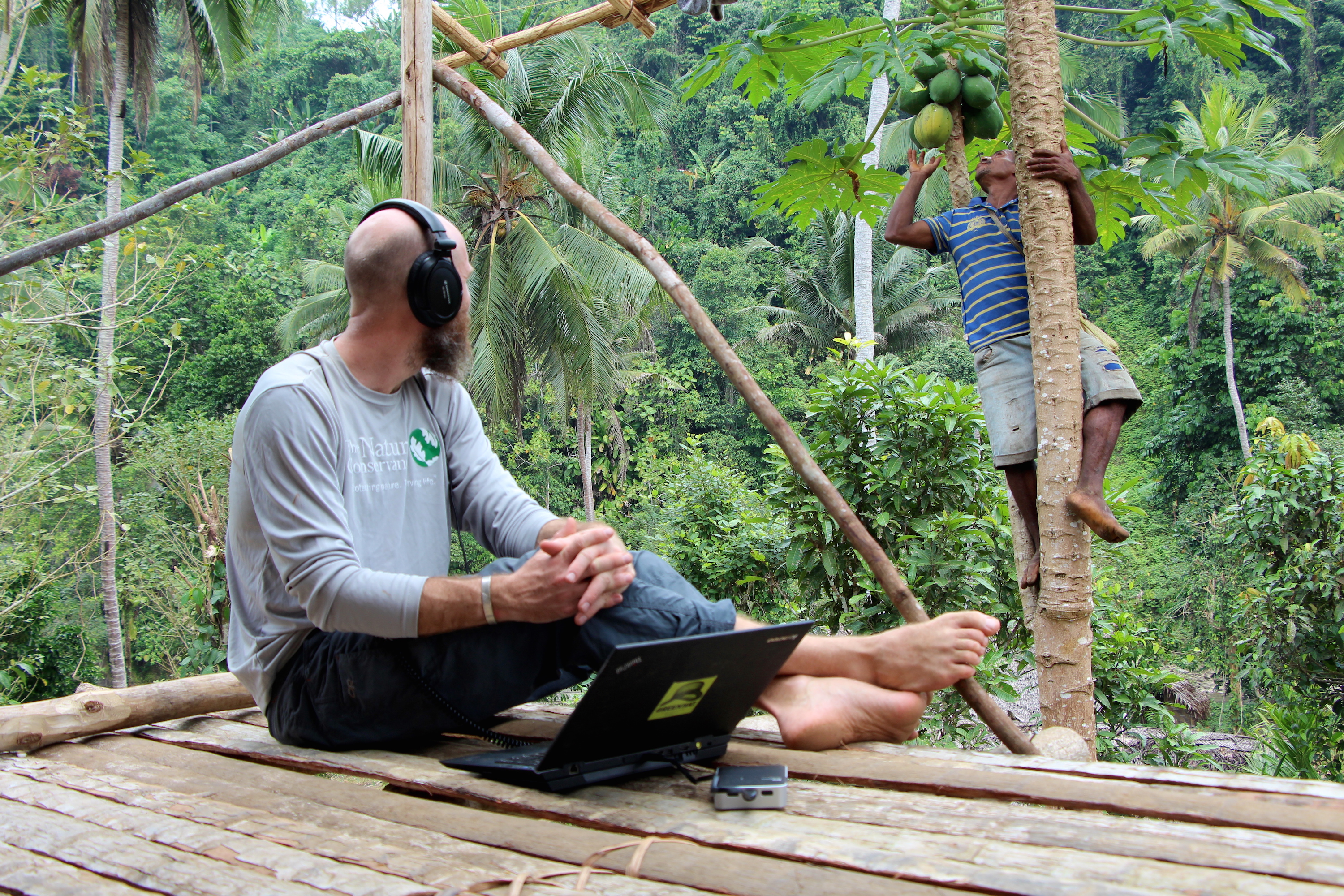
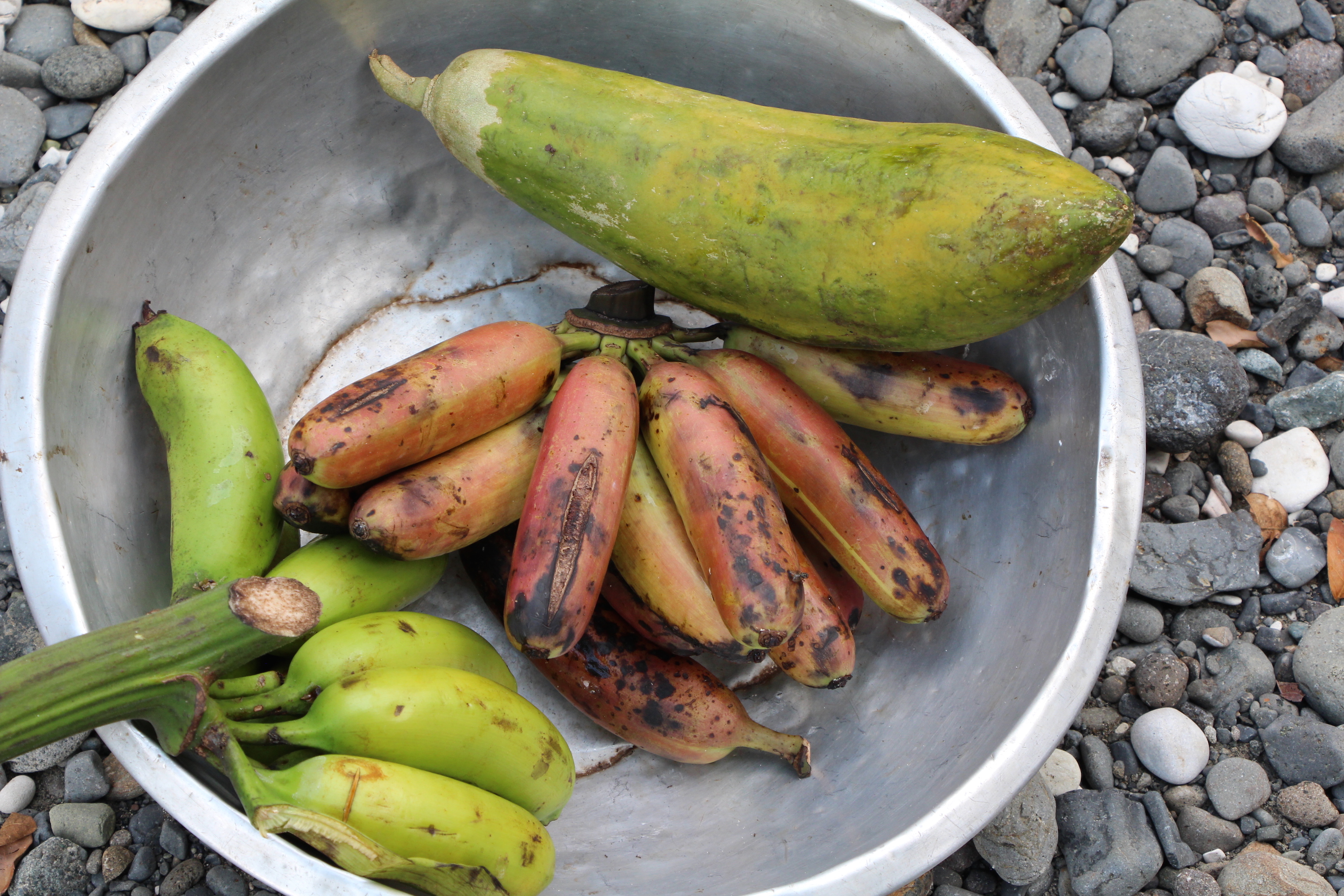
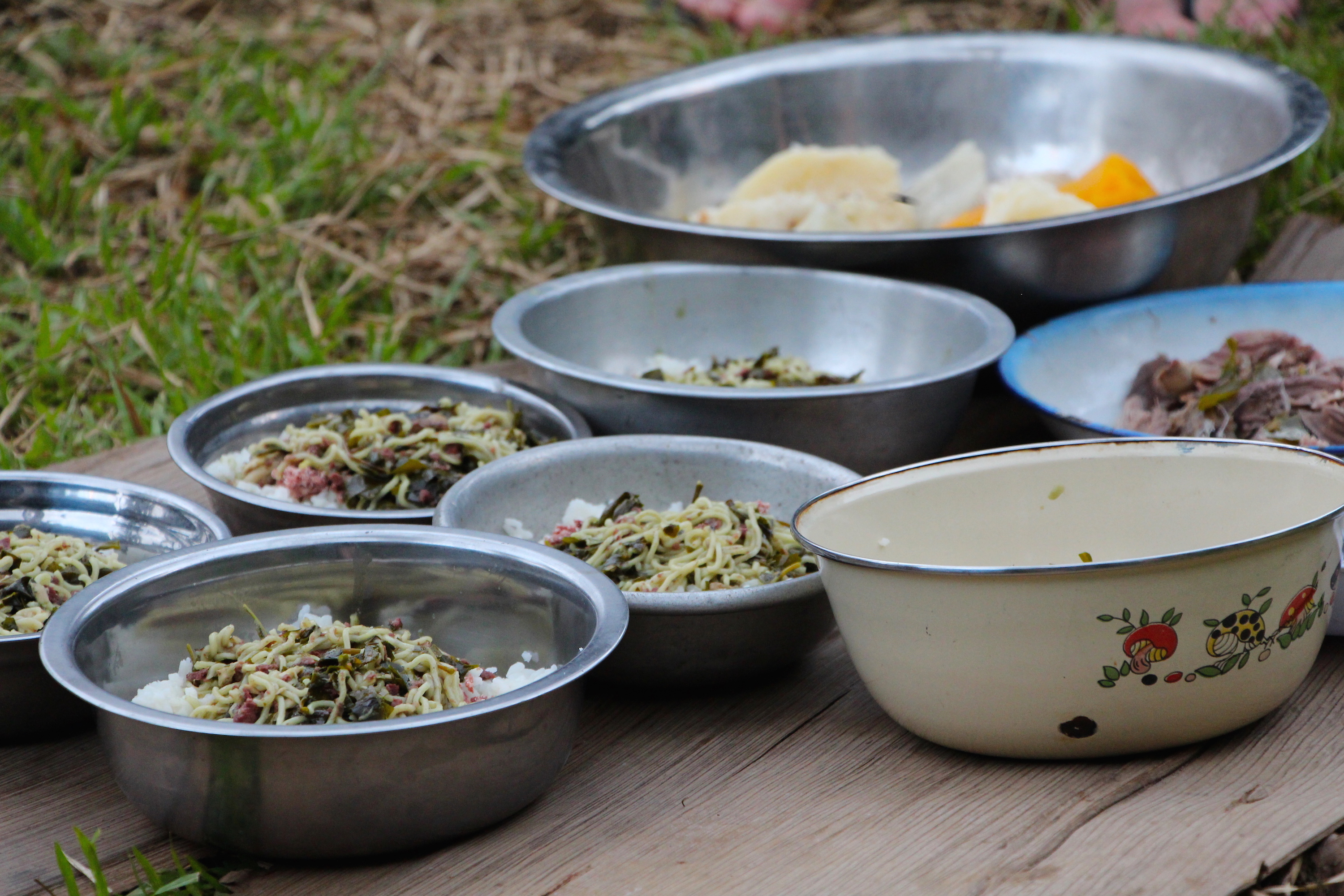
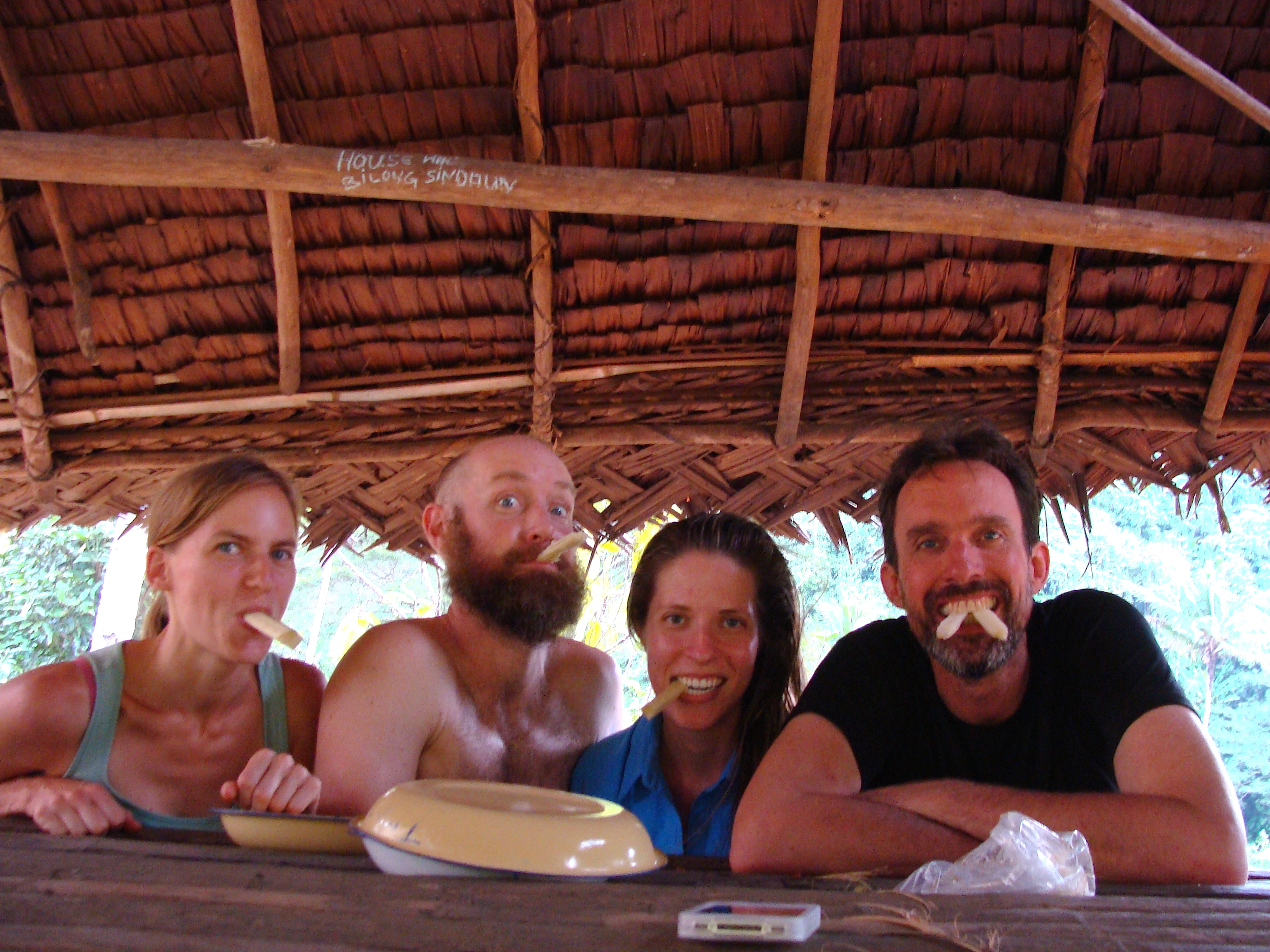
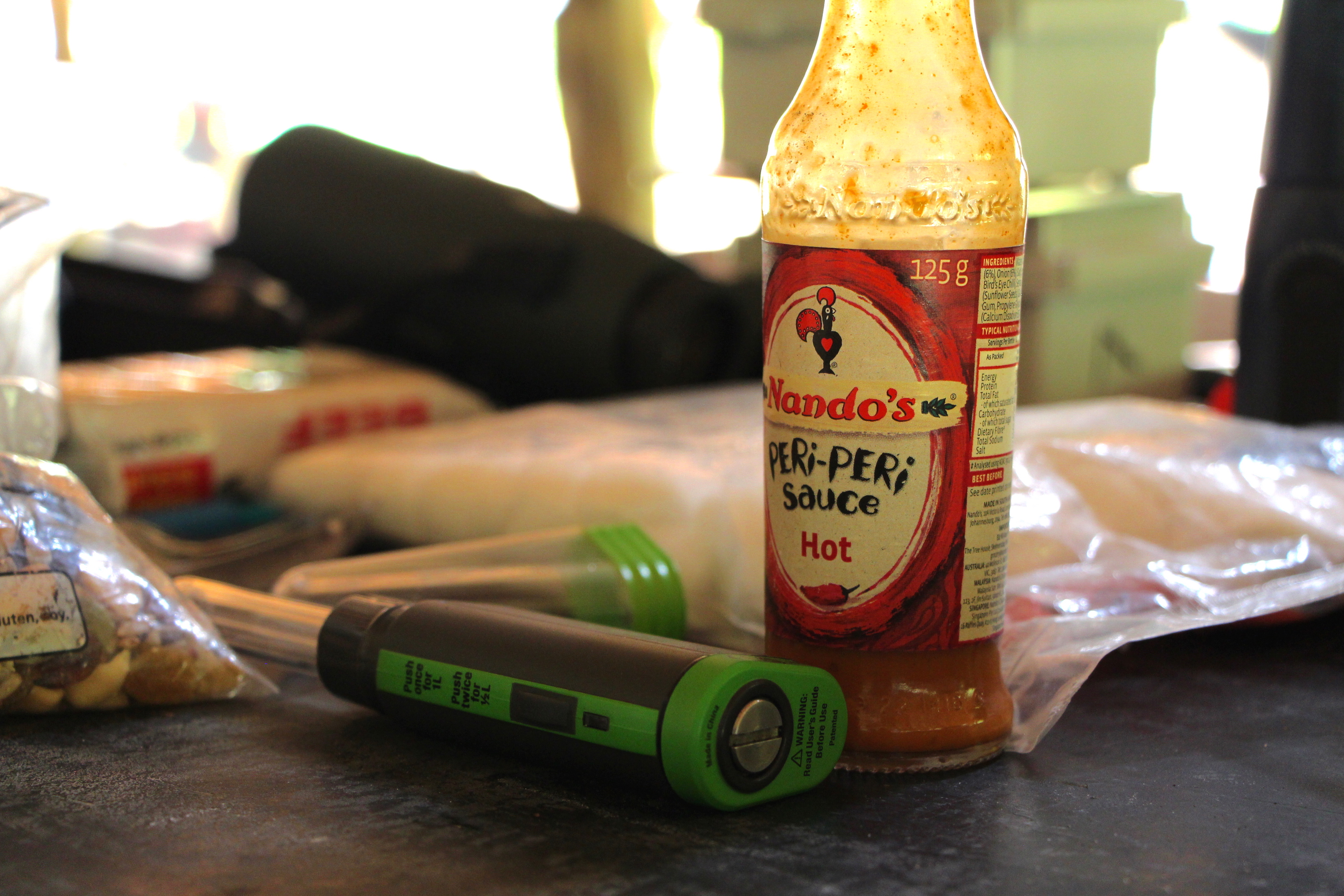
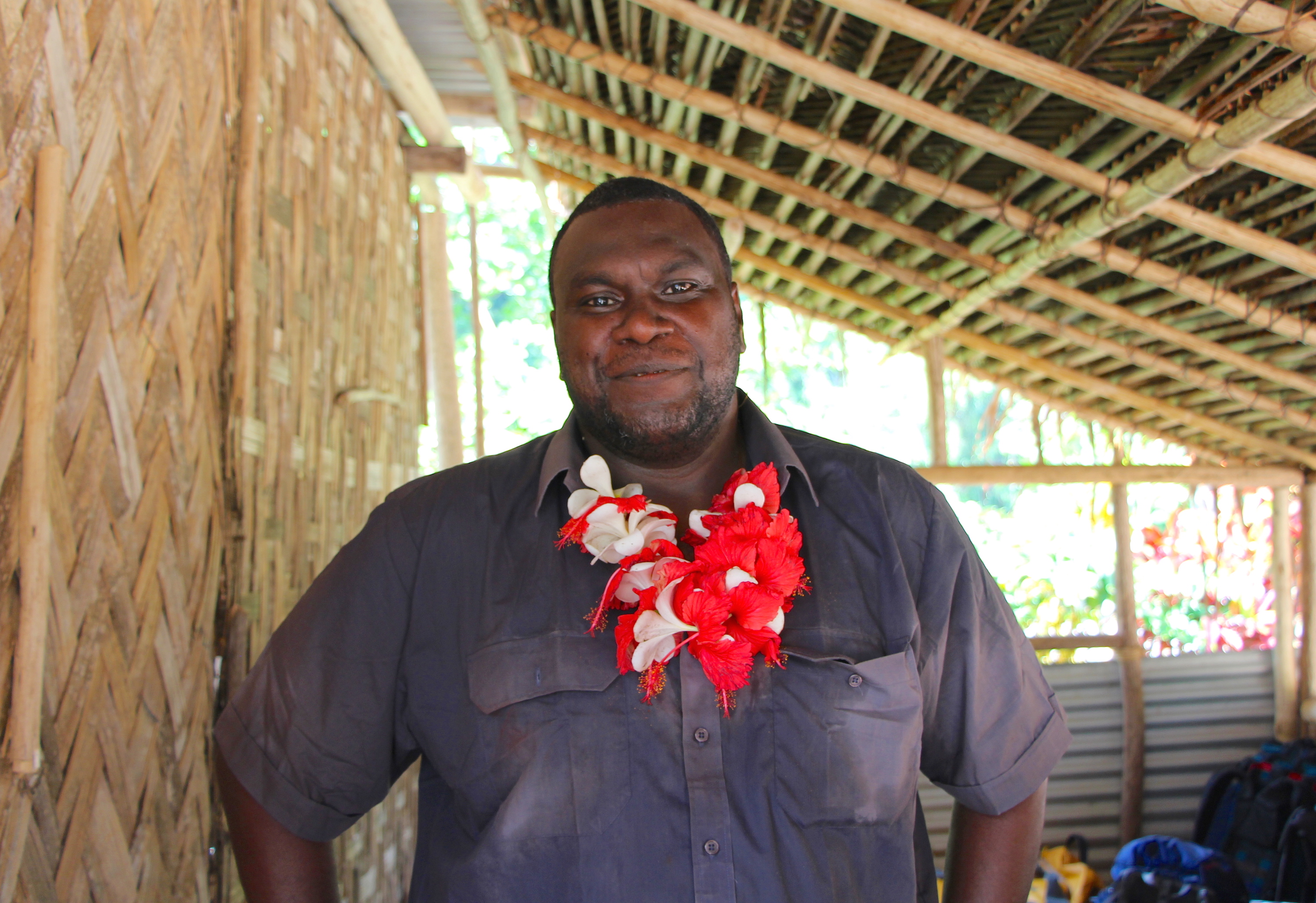
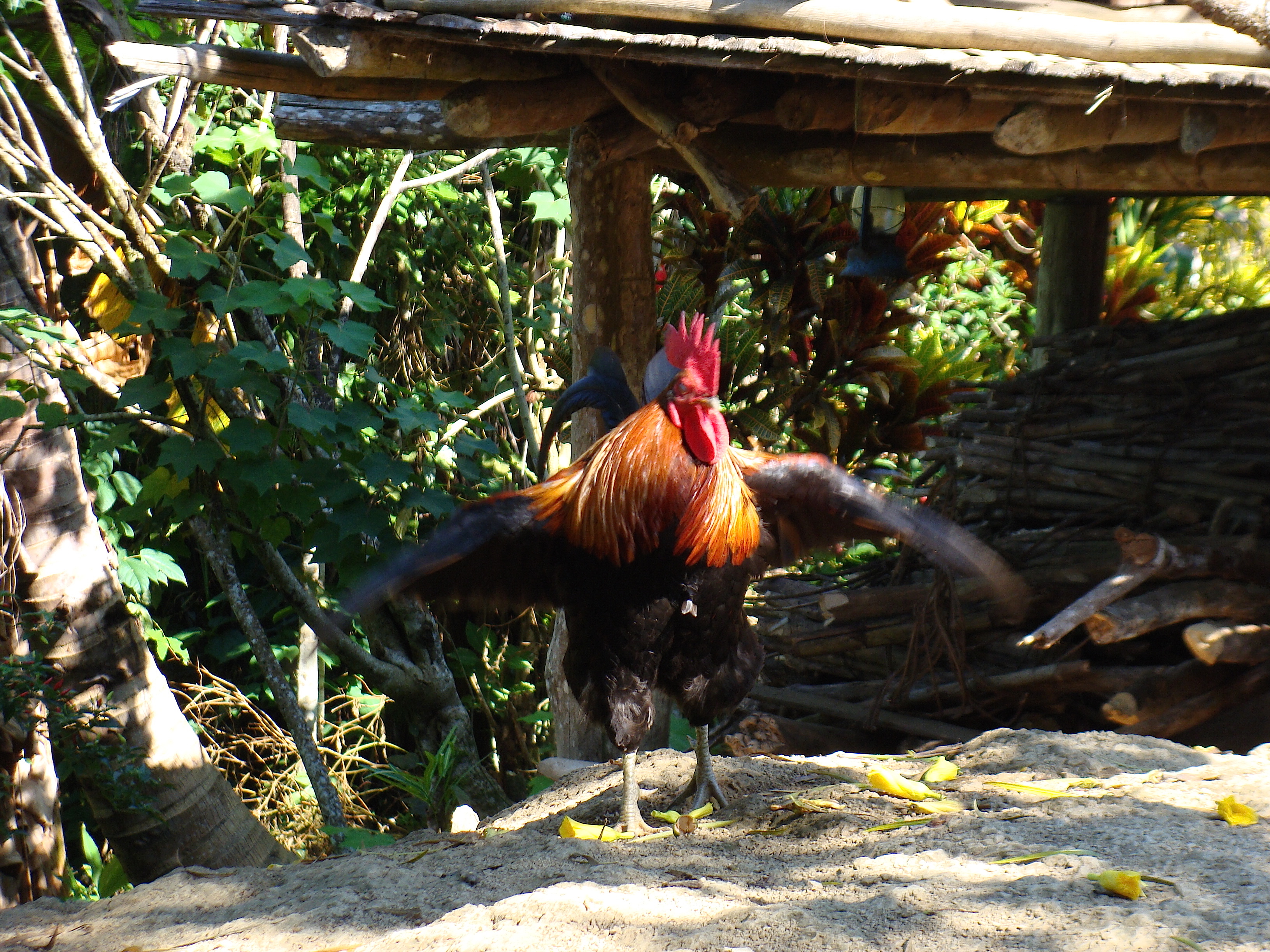
8:15 p.m. Work done, it’s time to unwind over some music and cards. Eddie attempts to teach us all 500, and Tim deflects any attempts at strategy with his erratic plays and inscrutable pokerface.
The Southern Cross glitters overhead, silhouetted by a faint strip of the Milky Way. Tim spots a lone circumpolar satellite gliding across the sky — the rest of the world feels as far away as that satellite, and it’s actually a wonderful feeling.
9:02 p.m. Bed time, but without the beds. After brushing our teeth and taking our malaria pills, we all scoot into our bedding and shove our mosquito nets into place. Wigging around, trying to get comfortable, Eddie and I laugh at the sibling-like banter coming from the next room. I drift off to the sounds of pigs snuffling in the dirt underneath the hut.
11:44 p.m. The local dogs sneak into the hut and steal our bananas. Eddie’s attempts to frighten them off with a stout stick of sugarcane are unsuccessful.
1:21 a.m. I wake up to find Tim leaning precariously over the edge of our hut’s porch, recorder held high. He heard a weird bird noise, and naturally he needed to record it.
3:31 a.m. The accursed roosters start up. Again. The good news is that we’re just hours away from another epic day of field science in the rainforest.
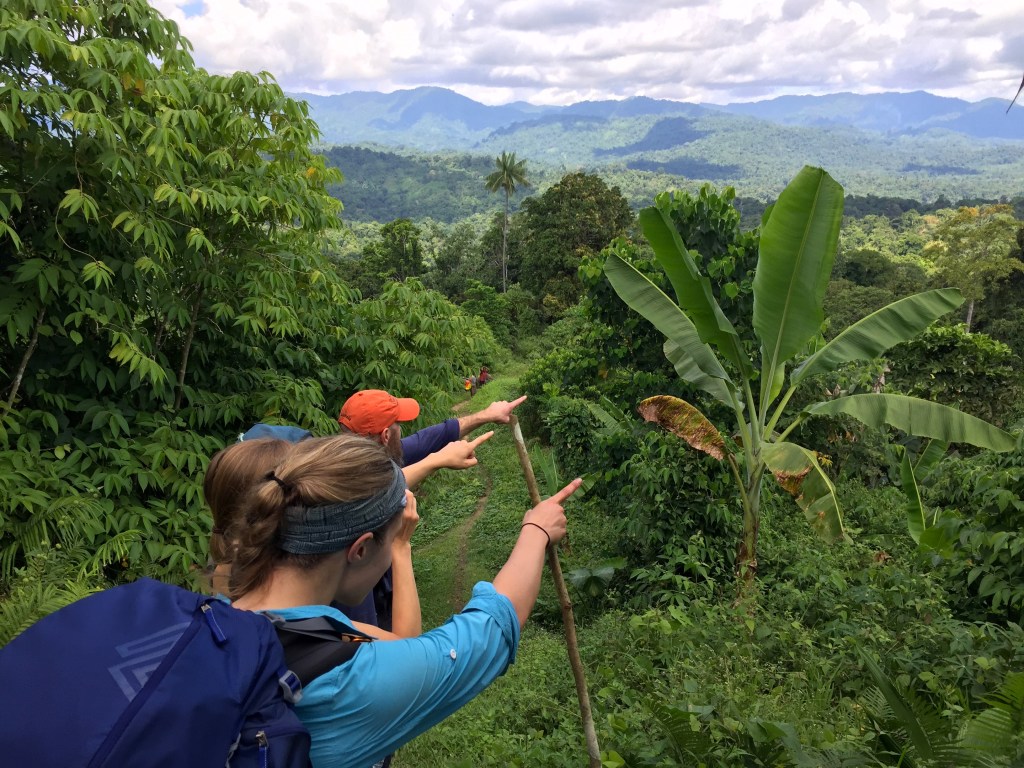



THROW THEM ON A ROCK, CONCRETE, TREE. SHOULD CRACK IT OPEN OR IVE IT A START!